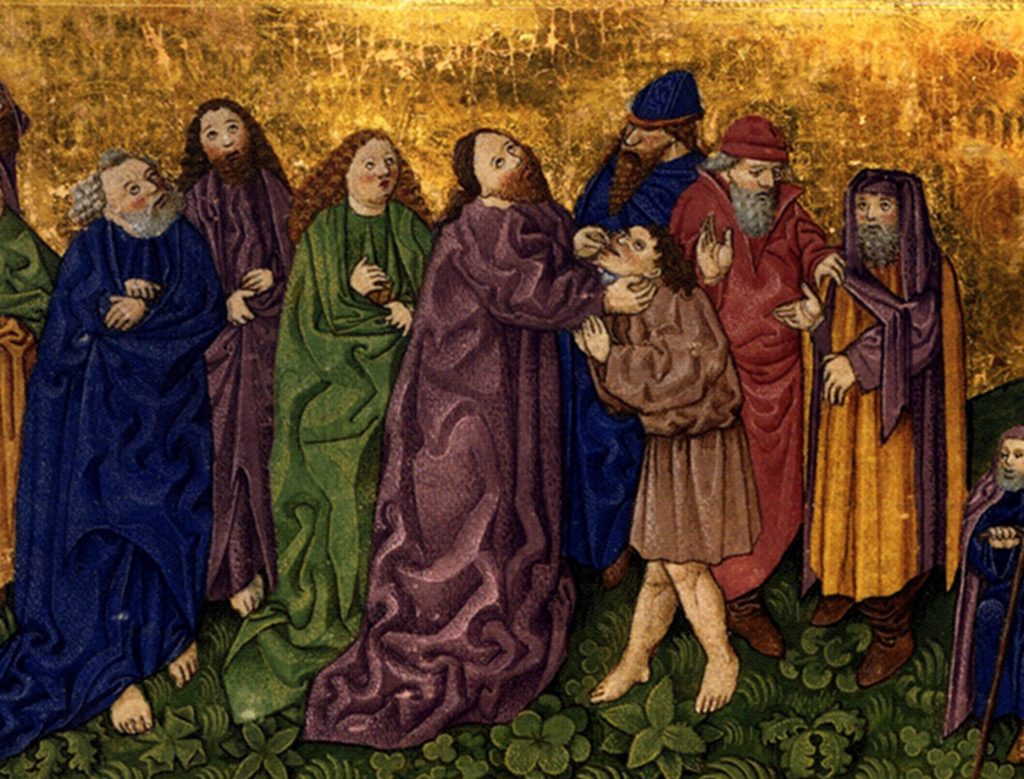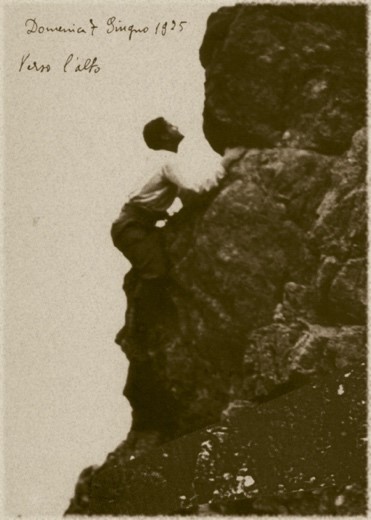HOMILY FOR MASS OF THE 23RD SUNDAY OF ORDINARY TIME YEAR B

Live-streamed from St. Mary’s Basilica, Sydney, 5 September 2021
“Say to all faint hearts: ‘Have courage! Do not be afraid!’” (Isa 35:4-7) It’s a recurring antiphon in the Bible.[1] Jesus said it to His disciples so many times you’d be excused for thinking He was getting repetitive![2] God, His Son, the prophets and evangelists come again and again to quell our anxieties and strengthen our resolve.
But what exactly does it mean for us to have courage or to be unafraid? Some people are wilfully blind to the scary stuff going on around them or even caused by them, or aware of it but unfrightened by it. This kind of fearlessness offers a false appraisal of reality and often pays out in reckless behaviour, like crossing a busy highway with eyes closed.
Jesus does not favour that kind of ‘courage’. He was always the realist (e.g. Mt 7:24-27). Instead of promising “God will make everything nice”, He warned that discipleship can cost us our lives or that real difficulties can come along with the rewards.[3] Instead of “block your ears”, He emphasised pursuing the truth as the way to freedom and to God.[4] Wilful deafness is a defect: Our Lord described as foolish those with eyes who will not see, ears who choose not to hear, minds that fail to understand.[5] “Let anyone with ears listen!” He said (Mt 11:15; 13:9) “Blessed are your eyes, for they see [Me], your ears, for they hear” (Mt 13:16).
Of course, people sometimes have good reason to block their ears. We sometimes block out the noise of children, phones, jackhammers, media, jet-planes (remember them?). Sometimes they are just too loud and overpower everything else, so blocking our ears is simple self-defence. At other times we are so overloaded with information or distracted by it that we must select. And genuine listening requires focus and sometimes we are just too tired or our minds wander. There is nothing cowardly about blocking our ears in these situations.
But we also know that voluntary deafness can be a kind of evasion, as when people refuse to hear what they don’t like or what they find too challenging. Blocked ears can even be a form of aggression, as when we deny someone a hearing or refuse to engage with their arguments or emotions. Even people who love each other can choose not to hear. With selective deafness and studied insensitivity, we can gradually dull our perception so that anything that might upset us or our present course is excluded. Closed ears can indicate closed minds—and usually some underlying anxiety. When Jesus says “Ephphatha, be opened” (Mk 7:31-37), He’s speaking to wilfully closed ears as much as biologically challenged ones and offering healing; when Jesus says “Have courage, be unafraid”, He’s speaking to anxious hearts and offering hope.
Josef Pieper, the great Catholic philosopher who lived through the rise and fall of Germany’s Third Reich, began his classic treatment of courage (or ‘fortitude’ in the old money) with the human experience of vulnerability: “without vulnerability there is no possibility of fortitude,” He said.[6] Those who are impervious to injury or do not fear it are not brave; the brave man risks or even suffers injury “as a means to preserve or to acquire a deeper, more essential intactness.” Courage “is neither attack, nor self-confidence, nor wrath, but endurance and patience” and consequently has two sides: fighting for the good, and continuing through the bad. In Reinhold Niebuhr’s famous Serenity Prayer, adopted by Alcoholics Anonymous and other 12-step programmes, people pray “Grant me the serenity to accept the things I cannot change, the courage to change the things I can, and the wisdom to know the difference.”[7] The courageous person pursues the good despite the difficulties. Pieper explores how courage is intrinsically connected to patience, martyrdom and hope: “In the world as it is constituted, it is only in the supreme test, which leaves no other possibility of resistance than endurance, that the inmost and deepest strength of man reveals itself.”[8]

We see something of this in our Gospel (Mk 7:31-37). A deaf Sidonian man who has struggled for years—perhaps his entire life—is brought to Jesus and then taken aside by Him as if into a confessional. In a ritual that would horrify our Chief Health Officer the man braves the Master’s spittle, touch and prayer. Despite long experience of nothing working, he has hope. Despite being warned not to speak of this miracle within earshot of the authorities, he bravely gives public witness—a kind of martyrdom —and the story spreads abroad.
The connection between courage, patience and hope speaks directly to us during pandemic and restrictions. Amidst palpable anxiety Australia’s original strategy was exclusion and elimination. Now many accept that we must live with the virus and through the virus as best we can. That many mean continuing risk and inconvenience. But this week’s YouGov poll found Australians are now less concerned about the dangers to physical health than they are about the pandemic’s impact upon jobs and mental health.[9] Some worry about the academic, psychological and social effects on young people. Others are feeling depression, frustration or anger themselves as the lockdowns roll on.
In our first reading from Isaiah today—and in every other book of the Bible—God calls us to courage, to persevere in precisely such situations. If we stay the course, the Prophet says, the blind, lame, deaf and dumb will all be healed and the wastelands of our hearts will be watered. Jesus, the One who says “of course I want to” when a leper asks if He wants to heal him (Mt 8:2-3; cf. Jn 5:6-7), wants to heal us too and to grace us with fortitude. So as we continue to observe lockdown, limit physical interactions and encourage vaccination, we beg God for the gift of perseverance.

Above all, at this time, we need hope. The hopeful person can be relaxed knowing both the good and the bad of this moment are impermanent, can trust in “a certain process of growth and development” on the horizon, and can work confidently towards it.[10] Hope believes in more and better, inspires people to strive for this, and sustains them in the struggle.[11] And the ultimate object of Christian hope is not just improved character as was the object of pagan courage: no, the object of hope is heaven itself.[12] Thus Paul describes those saved by grace not just as the faithful but also as the hopeful, those “called to hope”, “steadfast in hope”, “hoping against hope”, “cheerful hopers”, “heirs in hope”.[13] No more wilful blindness to danger, insensitivity to fear, foolhardiness in action or cowardice. No more ignoring reality as evasion or aggression. When we surrender to Christ’s love, our eyes and ears are opened, and we’re given the courage to embody hope, to endure present suffering, to live with patience and courage. For this we pray.

[1] Gen 15:1; 21:17; 26:24; 35:17; 43:23; 46:3; 50:19; Ex 14:13; 20:20; Lev 26:6; Num 14:9; 21:34; Dt 1:21; 3:2,22; 7:18-19; 20:1,3; 31:8; Josh 1:6-9,18; 8:1; 10:8,25; 11:6; Judg 6:23; Ruth 3:11; 1Sam 4:9,20; 12:20; 22:23; 23:17; 2Sam 9:7; 10:12; 13:28; 1Kings 2:2; 17:13; 2Kings 1:15; 6:16; 19:6; 25:24; 1Chr 19:13; 22:13; 28:20; 32:7; 2Chr 15:7; 20:15,17; 32:7; Neh 4:14; Tob 4:8,21; 5:10,16,21; 6:18; 7:16; 8:21; 11:11; 12:17; Judith 7:30; 11:1,3; 1Macc 2:62,64; 3:22,58; 4:8; 7:29; Ps 27:1,14; 31:24; 49:16; 55:19; 56:3,4,11; 78:53; 112:7-8; 118:6; Prov 3:25; Sir 41:3; Wis 8:7; Isa 7:4; 8:12; 10:24; 12:2; 35:4; 37:6; 40:9; 41:6,10,13,14; 43:1,5; 44:2,8; 51:7; 54:4; 57:11; 63:17; Jer 1:8; 10:5; 40:9; 42:11; Lam 3:57; Bar 4:5,27,30; 6:16,23,29,65,69; Ezek 2:6; 3:9; Zech 8:15; Dan 10:12,19; Hos 10:3; Joel 2:21,22; Zeph 3:16; Hag 2:4,5; Mal 3:5; cf. Acts 18:9; 23:11; 27:22-25; 1Cor 16:13; Heb 13:6; 1Pet 3:14; Rev 1:17; 2:10.
[2] Mt 8:26; 10:28,31; 14:27; 17:7; 28:10; Mk 4:40; 5:36;6:50; Lk 5:10; 8:25,50; 12:4,7,32; Jn 6:20; 12:15; 14:27; 16:33; cf. Mt 1:20; 25:25; 28:5; Lk 1:13,30; 2:10; 19:21.
[3] Mt 5:10-12; 10:16,28; 16:25; 24:9,12; Mk 10:30; Lk 9:24; 18:8; Jn 21:18-19 etc.
[4] e.g. Jn 1:14,17; 4:23-24; 8:32,45; 14:6,17; 15:26; 16:13; 17:8,17,19; cf. 18:38.
[5] Mt 13:13-16 et par; following Ps 115:6; Wis 15:15; Isa 6:9-10; 42:20; 43:8; Jer 5:21; 6:10; 25:4; Bar 2:31; Ezek 12:2; contra Isa 33:15.
[6] Josef Pieper, “Fortitude” in The Four Cardinal Virtues (trans.D. Coogan, University of Notre Dame Press, 1966). Cf. Thomas Aquinas, Lectura super Ioannem, 18 , lect. 4 , 2 and Summa Theologiae IIa IIae, q. 123.
[7] Fred Shapiro, “Who wrote the Serenity Prayer?” Chronicle of Higher Education 28 April 2014.
[8] Pieper, “Fortitude,” p. 150; see also “Hope” in Faith, Hope, Love (Ignatius Press, 2011).
[9] Natasha Bita, “New poll reveals what’s scaring Australians more than the Covid-19 pandemic,” Daily Telegraph 31 August 2021.
[10] Judith Andres, Worldly Virtue: Moral Ideals and Contemporary Life (Lexington Books, 2015), p. 36
[11] Dt 31:6; Ps 20:7; Isa 40:28-31; Mt 17:20; 19:26; 21:21; Jn 14:27.
[12] 1Pet 1:3-4; Rom 15:13 etc.
[13] 1Thes 1:3; 2Thes 2:16; Rom 4:18; 8:24-5; 12:12; Eph 1:12,18; 4;4; Tit 3:6-7.
Welcome to St Mary’s Cathedral in Sydney, for the Solemn Mass of the 23rd Sunday of Ordinary Time. As we look towards another month or more of lockdown, God speaks to us through His Word today about courage, patience, endurance and hope in the face of continued struggle. I ask you all to join me in praying for those most affected by the current situation. And we pray for our fathers, living and deceased, on this Fathers’ Day. To everyone watching via livestream, a very warm welcome!

